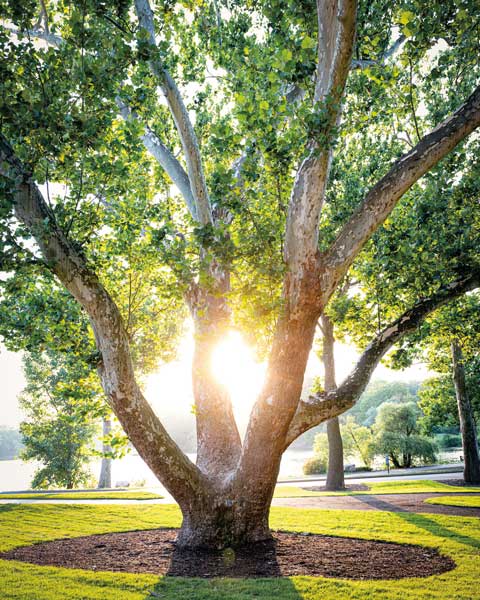GREENER MEASURES
“It cannot be emphasized enough how everything is interconnected.” — Pope Francis
Seven years ago, Laudato Si’ called upon businesses to get serious about sustainability. Today, Mendoza professors are putting the encyclical’s words into action by showing what it takes to measure and manage environmental impact.
In 2015, when Laudato Si’ (“On Care for Our Common Home”) was officially added to the social teaching of the Catholic Church, Erin Fitzgerald (FIN ’99) found herself with a front-row seat. A dairy industry executive, Fitzgerald was in Italy for the World’s Fair Expo, supporting its focus on “Feeding the Planet, Energy for Life.”
 The pope’s message was directed to “everyone living on this planet.” Fitzgerald saw that it was a message for business in a special way. There were many new sustainability technologies and innovations showcased at the Expo. But the pope argued that technology and innovation alone were not enough to solve our ecological crisis.
The pope’s message was directed to “everyone living on this planet.” Fitzgerald saw that it was a message for business in a special way. There were many new sustainability technologies and innovations showcased at the Expo. But the pope argued that technology and innovation alone were not enough to solve our ecological crisis.
To make a real difference, Pope Francis said, they must be guided by something deeper — by a profound “ecological conversion.”
As Fitzgerald read the encyclical and thought about the new “attitude of the heart” it calls for, one word in particular stood out — one that she had often heard from the farmers she worked with: stewardship. A steward, according to Laudato Si’, recognizes that “the world is a gift which we have freely received and must share with others.” This sacred duty to share the world with others includes preserving the environment for future generations while also using it for the good of everyone living, especially the poor and vulnerable.
Stewardship became central to Fitzgerald’s approach. She worked with farmers to develop new business models that included voluntary reductions in carbon emissions while also getting more of her farmers’ products into the hands of the one in six Americans — more than 50 million people — who lack consistent access to enough food. “To have carbon goals without goals to feed people, to take care of our neighbors,” she says, “that doesn’t seem right.”
“Now I talk about stewardship and sustainability,” Fitzgerald explains. And she insists on putting the two in that order. “Sustainability is about ability,” she says, “It is the ability to put a tough business model to work, to get the economics to line up for the community and the planet. That’s essential. But we can’t start there. We have to start with stewardship. You can’t reach sustainability goals or be an agent for change in your organization unless you are driven by a sense of purpose. And as soon as you are, you’ll start asking, ‘How can I make my business serve the community and the planet?’ and that’s a powerful way of thinking.”
Seven years after Laudato Si’, Mendoza professors remain hard at work integrating stewardship and sustainability in their own scholarship. Along the way, they are also helping both students and business leaders experience an ecological conversion of their own.
Measurement Matters
You may not place “accountant” high on your list of important environmental jobs. Twelve years ago, neither did Sandra Vera-Muñoz, the Deloitte Foundation Department Chair of Accountancy. Vera-Muñoz has taught Notre Dame accounting students since 1994. Starting out, her main expertise lay in judgment and decision making. But that all changed when she heard a presentation by Mindy Lubber, head of the Coalition for Environmentally Responsible Economies (CERES).
 Vera-Muñoz recalls that Lubber heralded a change on the horizon for the accounting profession. “Accountants are going to have a very important role to play in the sustainability space,” Lubber said during her talk. “Why? Because accountants have the know-how and the training for measuring, reporting and providing assurance on sustainability information — and this is exactly what investors and other stakeholders are clamoring for.”
Vera-Muñoz recalls that Lubber heralded a change on the horizon for the accounting profession. “Accountants are going to have a very important role to play in the sustainability space,” Lubber said during her talk. “Why? Because accountants have the know-how and the training for measuring, reporting and providing assurance on sustainability information — and this is exactly what investors and other stakeholders are clamoring for.”
It was an epiphany for Vera-Muñoz. “Accountants have traditionally done financial reporting,” she explains. But she says the addition of nonfinancial climate change and environmental information makes perfect sense. “Even when there is no dollar sign — when accountants are considering a schedule of greenhouse gas emissions, for example, rather than financial statements, the skills required for measuring, reporting and assuring this information are the same,” she says. Vera-Muñoz ran with this new mandate for the accounting profession, hoping to see accountants become the lynchpin in sustainability efforts. Vera-Muñoz saw the potential for accountants to help companies take their glossy CSR reports and well-intentioned talk about sustainability and translate them into concrete goals, measurable progress and environmental accountability.
Vera-Muñoz’s epiphany also suggested a whole array of new research questions. One especially tough question had to be tackled before any others: Is this something companies really want to do? Is there any business case, in other words, for measuring and reporting their environmental impact?
To answer this question, Vera-Muñoz combed through data from the Carbon Disclosure Project (CDP). Along with Ella Mae Matsumura of the University of Wisconsin-Madison and Rachna Prakash of the University of Mississippi, she began investigating what actually happens to companies that voluntarily report their carbon emissions.
Their study, published in The Accounting Review, reported a link between carbon emissions, carbon disclosures, and the overall value of a firm measured by its stock price. They found that firms whose emissions are low compared to their peers tend to be valued more highly. (On average, a firm’s value decreases by $212,000 for every added thousand metric tons of carbon emissions.) Firms that voluntarily disclose their emissions are valued even higher than peers who do not disclose their emissions.
In other words, Vera-Muñoz’s research proved Lubber correct: Investors really were paying attention to carbon emissions and disclosures. Vera-Muñoz explains that her findings suggest that for investors, lower emissions mean lower risk. They want to invest in companies that understand climate change risk and are preparing well. These companies will face fewer costs as stricter regulations appear and as they transition to more carbon-neutral business models.
For Vera-Muñoz, it all comes down to the old adage attributed to Peter Drucker: “You can’t manage what you don’t measure.” If a company is not collecting and reporting data, then investors will assume that it is doing little to manage its environmental impact.
In her more recent work, Vera-Muñoz has moved on to a related conundrum: Do investors think companies should disclose climate risk or not? During the period of Vera-Muñoz’s study, the Securities and Exchange Commission (SEC) did not require companies to disclose climate risk. But it had issued a set of guidelines suggesting that in certain cases, climate risk is “material information,” something companies must disclose. Vera-Muñoz wanted to understand how investors were responding to this murky set of rules.
She teamed up with Matsumura and Prakash once again, and their new study, forthcoming in the Review of Accounting Studies, is titled “Climate Risk Materiality and Firm Risk.” It reveals that the market rewards firms for disclosing climate risks in their 10-K filings. In line with their earlier work, Vera-Muñoz and her co-authors found that the penalty for nondisclosure is twice as large when investors expect climate risk to be “material information.”
In March 2022, the change in regulation Vera-Muñoz had been anticipating for more than a decade finally appeared. The SEC unveiled a new proposal that will require companies to disclose the risks that a changing climate poses to their business.
But Vera-Muñoz says the most important affirmation of her work came from Laudato Si’ itself. Her initial work on sustainability was published in 2014. When Laudato Si’ appeared the following year, she was overjoyed. And last year, when she launched a new course, Sustainability: Accounting, Reporting and Impact Investing, she decided to assign Laudato Si’. Before students wade into the course’s many technical topics and practical presentations, she prepares them with Pope Francis’s presentation of what he calls “integral ecology.”
Count What Counts
As much as the Druckerism “You can’t manage what you don’t measure” holds true, we also have to add to it another maxim, one that is often attributed to Albert Einstein: “Not everything that counts can be counted. And not everything that can be counted counts.” In fact, Laudato Si’ says as much itself: “True wisdom,” Pope Francis says, “is not acquired by a mere accumulation of data which eventually leads to overload and confusion, a sort of mental pollution.”
Peter Easton, the academic director of Mendoza’s Center for Accounting Research and Education (CARE), is accustomed with both the power and the limitations of data. As companies move toward more sustainable practices, many are providing ESG (environmental, social and governance) reports. And while Easton sees the trend as an encouraging one, he is also aware that, as he puts it, “In the ESG world, there is a lot of hype.”
Currently, he explains, the ESG data is the Wild West; there are more than 1,000 different rating systems and more than 5,000 different metrics currently in use. As Treasury Secretary Janet Yellen recently put it, “The current financial reporting system is not producing reliable disclosures. We need consistency of reporting frameworks over time, as well as comparability across firms and jurisdictions.” In fact, a recent study from the University of Chicago Booth School of Business showed that high ESG scores often have more to do with how many metrics companies disclose, not the quality of their measurements.
To illustrate the type of problem this may cause, Easton points to the example of JetBlue, the first airline to raise financing linked to ESG goals. JetBlue’s loan, supplied by BNP Paribas, would move to a higher or lower interest rate depending on ESG scores supplied by a third-party agency called Vigeo Eiris. Easton questions whether the agreement will work in practice and whether the 38 criteria used by Vigeo Eiris holds up to scrutiny. Can they really objectively measure not just carbon emissions, but the other areas they claim to track, including “human rights, community involvement, human resources, business behavior and corporate governance”?
 Recognizing the need to provide guidance on these issues, Easton and CARE have redirected 100% of their efforts toward measurement, sustainability and responsible investing. The key to their new approach is collaborative conversations. They bring together accountants, financiers, lawyers, lawmakers, economists and scientists. The idea is that getting professionals with different expertise to speak to one another is the only way we can ensure that we are counting what truly counts. These collaborative conversations will keep academics from developing measures that are irrelevant to companies. It will prevent companies from developing measures that are unscientific. It will also help accountants and financiers know the right questions to ask when they scrutinize ESG metrics.
Recognizing the need to provide guidance on these issues, Easton and CARE have redirected 100% of their efforts toward measurement, sustainability and responsible investing. The key to their new approach is collaborative conversations. They bring together accountants, financiers, lawyers, lawmakers, economists and scientists. The idea is that getting professionals with different expertise to speak to one another is the only way we can ensure that we are counting what truly counts. These collaborative conversations will keep academics from developing measures that are irrelevant to companies. It will prevent companies from developing measures that are unscientific. It will also help accountants and financiers know the right questions to ask when they scrutinize ESG metrics.
Easton, who is also the Notre Dame Alumni Professor of Accountancy, offers photosynthesis technology as an example: “Suppose a chemist comes up with a new method of photosynthesis using algae in the sea. How do we know what the impact of that is going to be if we don’t have careful measures of the likely outcome? This applies just as much to the chemist as to an engineer or a CO2 emissions specialist.”
When CARE was founded in 2004, the Center’s goal was to help shape the agenda of young researchers. Even in its new iteration, CARE upholds this goal. During CARE’s inaugural conference in 2021 on the topic of accounting for sustainability and responsible investment, Saudi Arabia’s Princess Nouf Bint Mohammed Bin Abdullah, CEO of the King Khalid Foundation declared to conference attendees, “Accountants will need to be more than reporters. They will need to be influencers — and the guardians of the future.”
On the heels of its conference, CARE and Easton have joined together with academics from the University of Amsterdam, the University of Florida and Columbia Business School in order to found a new journal called Accountability in a Sustainable World. The move from accounting to accountability is deliberate. It embraces this new broader mandate that accounting professionals have in building a more environmentally friendly future and breaks with academic norms by including contributions from academics and practitioners who use the research in accounting and investing.
In November 2022, CARE plans to share its unique approach to sustainability to its largest audience yet. It will host its conference alongside the most important climate summit in the world, the United Nations Climate Change Conference (COP 27), which will take place in Sharm el-Sheikh, Egypt.
Embrace Interconnection
We cannot develop the right approach to the environment, Laudato Si’ repeats again and again, without recognizing that “everything is interconnected.” The idea sounds simple enough. But as the encyclical makes clear, it can be difficult in practice. It is all too easy, for example, to focus myopically on economic growth without thinking about what the encyclical calls “authentic human growth.” Pope Francis calls for “a humanism capable of bringing together the different fields of knowledge, including economics, in the service of a more integral and integrating vision.”
Developing this “integral and integrating vision” is at the heart of another new sustainability class, co-taught by Jessica McManus Warnell, associate teaching professor
 of management, and Eva Dziadula, associate teaching professor of economics. The Climate, Economics and Business Ethics course helps students develop the integrated, holistic mindset necessary to tackle our toughest ecological problems. One of Notre Dame’s “integration” courses, it aims to help students integrate areas of knowledge that typically remain separate.
of management, and Eva Dziadula, associate teaching professor of economics. The Climate, Economics and Business Ethics course helps students develop the integrated, holistic mindset necessary to tackle our toughest ecological problems. One of Notre Dame’s “integration” courses, it aims to help students integrate areas of knowledge that typically remain separate.
McManus Warnell first recognized the need for an integrated vision in 2011 when she became interested in the Fukushima Daiichi nuclear disaster. Over the decade that has passed since the disaster, McManus Warnell has made many trips, both on her own and with students, to conduct detailed studies of the nuclear meltdown’s social and environmental causes and consequences.
“Fukushima,” she says, “is heavy on the consciousness of Japan. It’s their 9/11. They lost 19,000 people.” She has learned that “you can’t look at a disaster like that without acknowledging how interconnected our natural environment is with our economic mechanisms and with our communities. You had an earthquake and that natural event triggered a tsunami, another natural event,” she says. “But so much of the damage was exacerbated by bad business planning.”
A major portion of McManus Warnell’s teaching focuses not just on preventing crises but rather on staying resilient as crises arise. She points out that storm intensity is increasing with climate change, and natural hazards will continue to proliferate. “But a natural hazard only truly becomes a disaster,” she says, “when human beings fail to manage it well.” Her research has shown, for example, that while material resources like infrastructure help communities respond to disasters, the immaterial supports like social capital matter as well. She finds that “communities with supportive networks, with good local government and with community-business partnerships do much better in responding to natural disasters.”
McManus Warnell’s work on Fukushima dovetails with Dziadula’s work on the economics of immigration. Dziadula exposes students to climate-driven migration in her courses during immersive trips to Mexico and China. In China, she notes that young workers from rural areas that suffer from landslides and erratic weather patterns are forced to find work in cities. “They often leave their children behind with grandparents or bringing them along knowing they won’t be able to attend school, further increasing the urban and rural inequality,” Dziadula explains.
“Even 10 years ago, Mendoza students were not talking about climate change,” said McManus Warnell, “But now our students follow it, and they care.” The purpose of her course is not to make students experts on climate change. And it is still less to make them experts on Fukushima or labor migration. Rather, it is to give each student a broader way of imagining problems and greater sensitivity to the needs of all those who might be affected by their decisions as business leaders. “We are helping them adapt to a reality that is already here and preparing them to lead ethically in the world of the future,” McManus Warnell says.
Make Ecology your Business
If anyone lives out Laudato Si’s message to “hear both the cry of the earth and the cry of the poor,” it is Rev. Oliver Williams, C.S.C. — or Father Ollie, as he is known around the College. Williams has served as the director of the Center for Ethics and Religious Values in Business since 1980. His work as a priest and scholar sometimes takes him to places of power and influence. And sometimes it takes him to the poorest of the poor, like those in South Africa among whom he ministered for many years while studying the effects of apartheid.
 Williams, who was trained as an engineer and naval officer, is a founding member of the United Nations Global Compact, the world’s largest voluntary corporate citizenship initiative. To date, more than 15,000 companies from 165 countries have joined the Compact. Collectively, they have issued nearly 90,000 public reports on their efforts to make sustainable development a reality.
Williams, who was trained as an engineer and naval officer, is a founding member of the United Nations Global Compact, the world’s largest voluntary corporate citizenship initiative. To date, more than 15,000 companies from 165 countries have joined the Compact. Collectively, they have issued nearly 90,000 public reports on their efforts to make sustainable development a reality.
When Laudato Si’ appeared, Williams and his colleagues at the UN wrote an open letter to the pope, offering to “share with the Church in embracing a principles-based approach to enterprise.” The official reply from the Vatican affirmed that “the Holy Father is appealing to the consciences of all people of goodwill that there may be a greater awareness for responsible business practices; to this, the UN Global Compact can give a significant contribution.”
Wiliams’s work on the UN Global Compact gives him a global perspective on whether companies’ sustainability efforts really add up. He has seen firsthand what it takes to get organizations to set clear goals, realistically assess how far they have to go, build a scoreboard to track their success and stay accountable by making their progress public. While acknowledging we have far to go to avert a climate catastrophe, he remains hopeful.
“While it’s typical to be critical of companies that are moral failures,” he explains, “I’ve never thought that was the right way to motivate yourself or to educate young future leaders. The better way is to look to role models, the people who are already doing it and doing it well.”
Occasionally, Williams is even able to bring these role models directly to students. In January, Williams hosted an event for Notre Dame and Trinity College Dublin students that featured a conversation between UN Global Compact CEO Sanda Ojiambo and former Unilever CEO Paul Polman.
Now students can add Erin Fitzgerald’s name to their list of role models as well. The same year she returned from Italy inspired by Laudato Si’, Fitzgerald was named a White House Champion of Change for Sustainable and Climate-Smart Agriculture. Today, she is the CEO of U.S. Farmers and Ranchers in Action, an organization that represents 1.5 million farmers. She recently launched a movement called the “Decade of Ag” that calls for green investment in the food and agriculture industry and invites industry leaders to sign on to meet the United Nations Sustainable Development Goals by 2030. To date, more than 150 CEOs have joined the movement.
When Fitzgerald thinks about what Notre Dame students can bring to the work of sustainability, she insists that everyone has something to bring. “Sustainability is complicated. It is the most interdisciplinary and most interdependent field we’ve ever known,” she says, “You’ve got to take whatever talent and training you have and put it to work.”
And that, of course, leads her back to stewardship, and to the famous Notre Dame slogan, What would you fight for? “We’ll have to fight for a sustainable future,” she explains, “You wouldn’t have to fight if it were easy.”

Comments